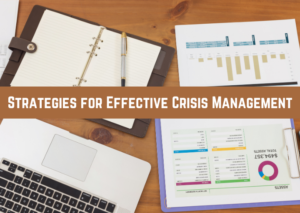
For organizations of all sizes and industries, crisis circumstances can appear out of the blue and present serious difficulties. Effective crisis management is essential to navigating these challenging times successfully, regardless of whether there is a natural disaster, cybersecurity breach, or global pandemic. The strategies leaders can use to guide their organizations through crises and ensure their resilience and survival are covered in this article. We will examine critical facets of crisis management that every leader should take into account, from communication to decision-making.
The CEO’s Role in Crisis Management
The CEO is crucial to crisis management since he or she is the senior executive of the company. As they lead the entire organisation through the difficulties and uncertainties of a crisis, they must demonstrate strong leadership and make difficult choices. The reputation of the company, stakeholder relationships, and overall survival can all be significantly impacted by the CEO’s decisions and actions during a crisis. Let’s look at some key tactics that CEOs might use for efficient crisis management.
- Create a crisis management team in step one.
A specific crisis management team made up of key executives and subject matter experts from pertinent departments should be formed by the CEO in order to handle a crisis successfully. The crisis management strategy should be created and carried out by this team, which should also be in charge of coordinating communication efforts and making crucial choices in the moment. The CEO ensures thorough crisis management coverage by establishing a varied team with a spectrum of expertise.
- Create a thorough crisis management strategy
The organization must have a well-defined crisis management plan to help it through a crisis. A strategy that specifies roles and duties, communication protocols, decision-making processes, and escalation procedures should be created by the CEO in collaboration with the crisis management team. To ensure the success of the strategy and that it is in line with how crises change over time, it should be periodically evaluated, revised, and tested.
- Keep in constant and timely communication
Open and honest communication is crucial during a crisis. The CEO should take the lead in communication activities, giving stakeholders including employees, clients, suppliers, and customers frequent updates. Transparent communication promotes trust and shows an organization’s dedication to crisis management. The CEO must also be ready to respond to questions, offer assurances, and exude confidence and stability.
- Make judgments that are quick and flexible
Leaders frequently have to make difficult decisions during crises while under time constraints and with limited information. The CEO must be able to make prompt choices while analysing the pros and disadvantages and keeping the organization’s best interests in mind. As the crisis develops, it becomes increasingly important to be flexible and adaptable, requiring quick modifications to strategies and plans. The CEO needs to promote a culture that values quick thinking and creative problem-solving
- Make enhancing staff support and welfare a top goal.
During a crisis, workers could feel overpowered, stressed, and anxious. The CEO must prioritize workers’ well-being and provide them with resources for overcoming challenges. This calls for honest communication, ready access to resources and information, support for mental health, and adaptability in work schedules. By demonstrating care and empathy for the employees, the CEO fosters a sense of cohesiveness and resiliency inside the business
Frequently Asked Questions (FAQs)
- What part does the CEO play in handling a crisis?
By giving leadership, making difficult decisions, coordinating communication efforts, and steering the organisation through the difficulties of a crisis, the CEO plays a crucial part in crisis management.
- Why is clear communication crucial in times of crisis?
During a crisis, open communication fosters trust, reassures stakeholders and indicates an organization’s dedication to handling the situation skillfully.
- In a crisis, how can CEOs put employee welfare first?
CEOs may put employee well-being first during a crisis by keeping lines of communication open, granting access to tools and information, offering assistance, and being flexible with work schedules. health
- Why are flexibility and agility crucial for crisis management?
In order for leaders to make quick judgments, modify plans as the crisis develops, and successfully deal with uncertainty, agility, and adaptability are crucial.
- How frequently should a brand-new crisis management strategy be assessed?
To keep a crisis management plan effective and in line with how crises evolve over time, it should be routinely evaluated, modified, and tested.
- What role does a crisis management team play?
A crisis management team, which assembles important executives and specialists to formulate and carry out the plan, coordinate communication efforts, and make significant decisions in real time, is essential for effective crisis management.
Conclusion
CEOs have a crucial role to play in crisis management in the volatile corporate environment of today. CEOs may successfully guide their organizations through crises by forming a crisis management team, creating a thorough plan, speaking openly, making quick decisions, and placing a priority on employee support. Effective crisis management not only lessens the crisis’s effects but also boosts the organization’s resilience and gets it ready for new challenges. CEOs have the ability to steer their organizations through challenges so that they come out the other side stronger.
